Analysis of Islamic Corporate Governance and Financial Products
VerifiedAdded on 2019/09/30
|8
|2262
|487
Report
AI Summary
This report provides a comprehensive literature review of corporate governance models, including Anglo-US, Japanese, and German models, followed by an in-depth analysis of Islamic corporate governance and the role of the Sharia Committee in Australia. It examines the structure and functions of the Sharia Committee, its responsibilities, and its adherence to Islamic law (Shariah). The report investigates the current landscape of Islamic financial products in Australia, including equity, bonds, and various investment schemes, and discusses relevant regulations, including AAOIFI and IFSB standards. It highlights the challenges and opportunities within the Australian market, emphasizing the need for a clear regulatory framework and mechanisms to facilitate the development of Islamic finance, and concludes with recommendations for future growth and integration of Islamic financial services.
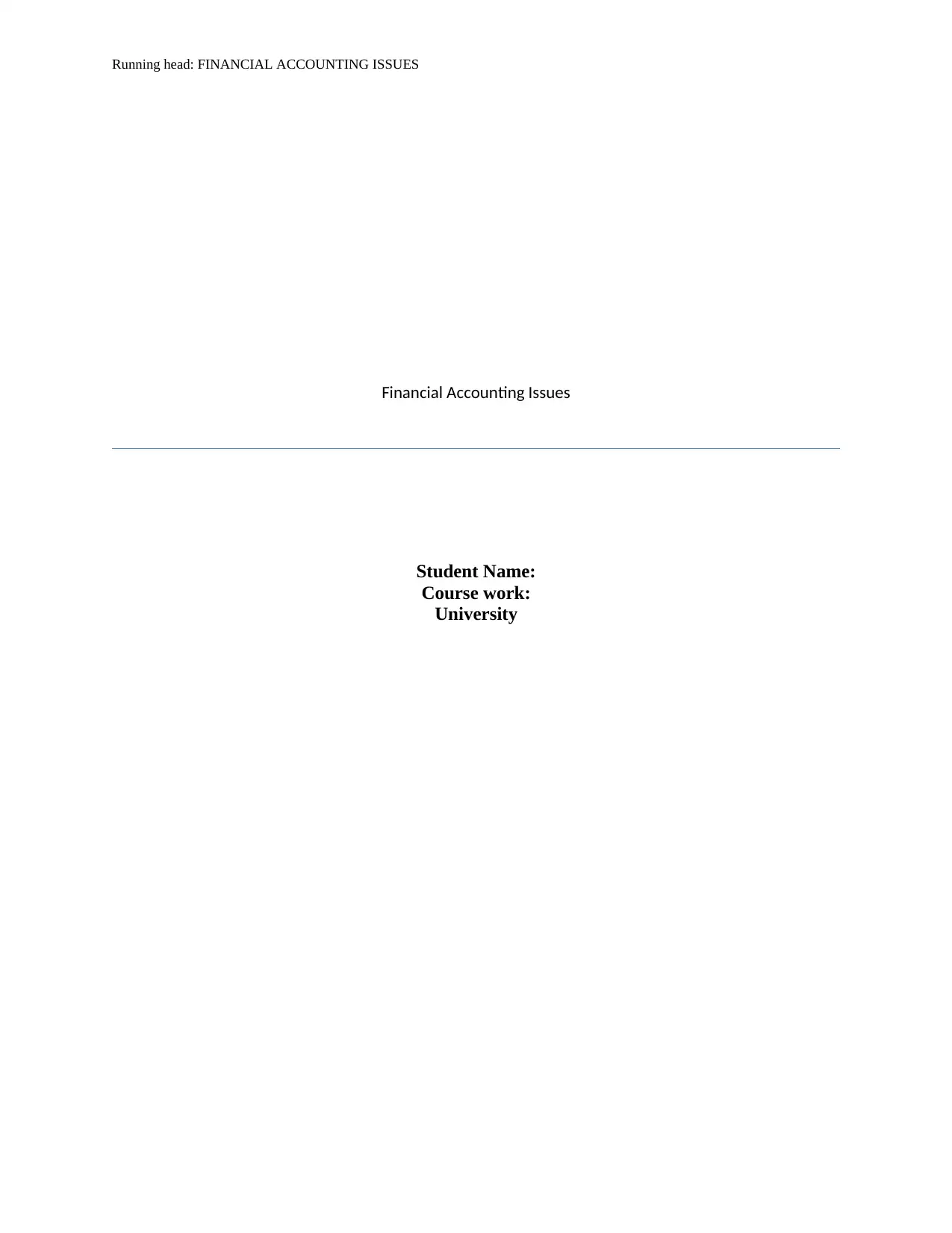
Running head: FINANCIAL ACCOUNTING ISSUES
Financial Accounting Issues
Student Name:
Course work:
University
Financial Accounting Issues
Student Name:
Course work:
University
Paraphrase This Document
Need a fresh take? Get an instant paraphrase of this document with our AI Paraphraser
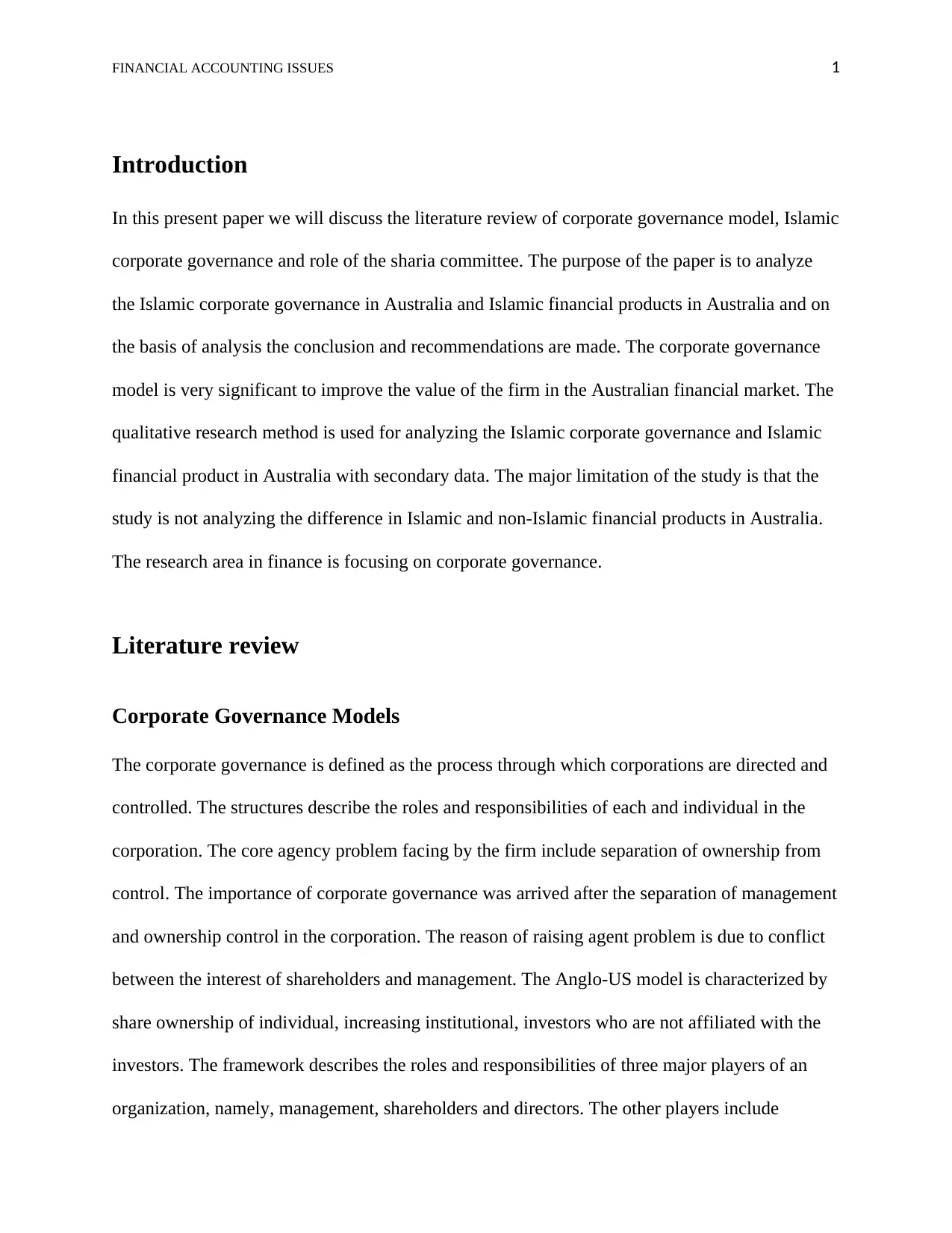
FINANCIAL ACCOUNTING ISSUES 1
Introduction
In this present paper we will discuss the literature review of corporate governance model, Islamic
corporate governance and role of the sharia committee. The purpose of the paper is to analyze
the Islamic corporate governance in Australia and Islamic financial products in Australia and on
the basis of analysis the conclusion and recommendations are made. The corporate governance
model is very significant to improve the value of the firm in the Australian financial market. The
qualitative research method is used for analyzing the Islamic corporate governance and Islamic
financial product in Australia with secondary data. The major limitation of the study is that the
study is not analyzing the difference in Islamic and non-Islamic financial products in Australia.
The research area in finance is focusing on corporate governance.
Literature review
Corporate Governance Models
The corporate governance is defined as the process through which corporations are directed and
controlled. The structures describe the roles and responsibilities of each and individual in the
corporation. The core agency problem facing by the firm include separation of ownership from
control. The importance of corporate governance was arrived after the separation of management
and ownership control in the corporation. The reason of raising agent problem is due to conflict
between the interest of shareholders and management. The Anglo-US model is characterized by
share ownership of individual, increasing institutional, investors who are not affiliated with the
investors. The framework describes the roles and responsibilities of three major players of an
organization, namely, management, shareholders and directors. The other players include
Introduction
In this present paper we will discuss the literature review of corporate governance model, Islamic
corporate governance and role of the sharia committee. The purpose of the paper is to analyze
the Islamic corporate governance in Australia and Islamic financial products in Australia and on
the basis of analysis the conclusion and recommendations are made. The corporate governance
model is very significant to improve the value of the firm in the Australian financial market. The
qualitative research method is used for analyzing the Islamic corporate governance and Islamic
financial product in Australia with secondary data. The major limitation of the study is that the
study is not analyzing the difference in Islamic and non-Islamic financial products in Australia.
The research area in finance is focusing on corporate governance.
Literature review
Corporate Governance Models
The corporate governance is defined as the process through which corporations are directed and
controlled. The structures describe the roles and responsibilities of each and individual in the
corporation. The core agency problem facing by the firm include separation of ownership from
control. The importance of corporate governance was arrived after the separation of management
and ownership control in the corporation. The reason of raising agent problem is due to conflict
between the interest of shareholders and management. The Anglo-US model is characterized by
share ownership of individual, increasing institutional, investors who are not affiliated with the
investors. The framework describes the roles and responsibilities of three major players of an
organization, namely, management, shareholders and directors. The other players include
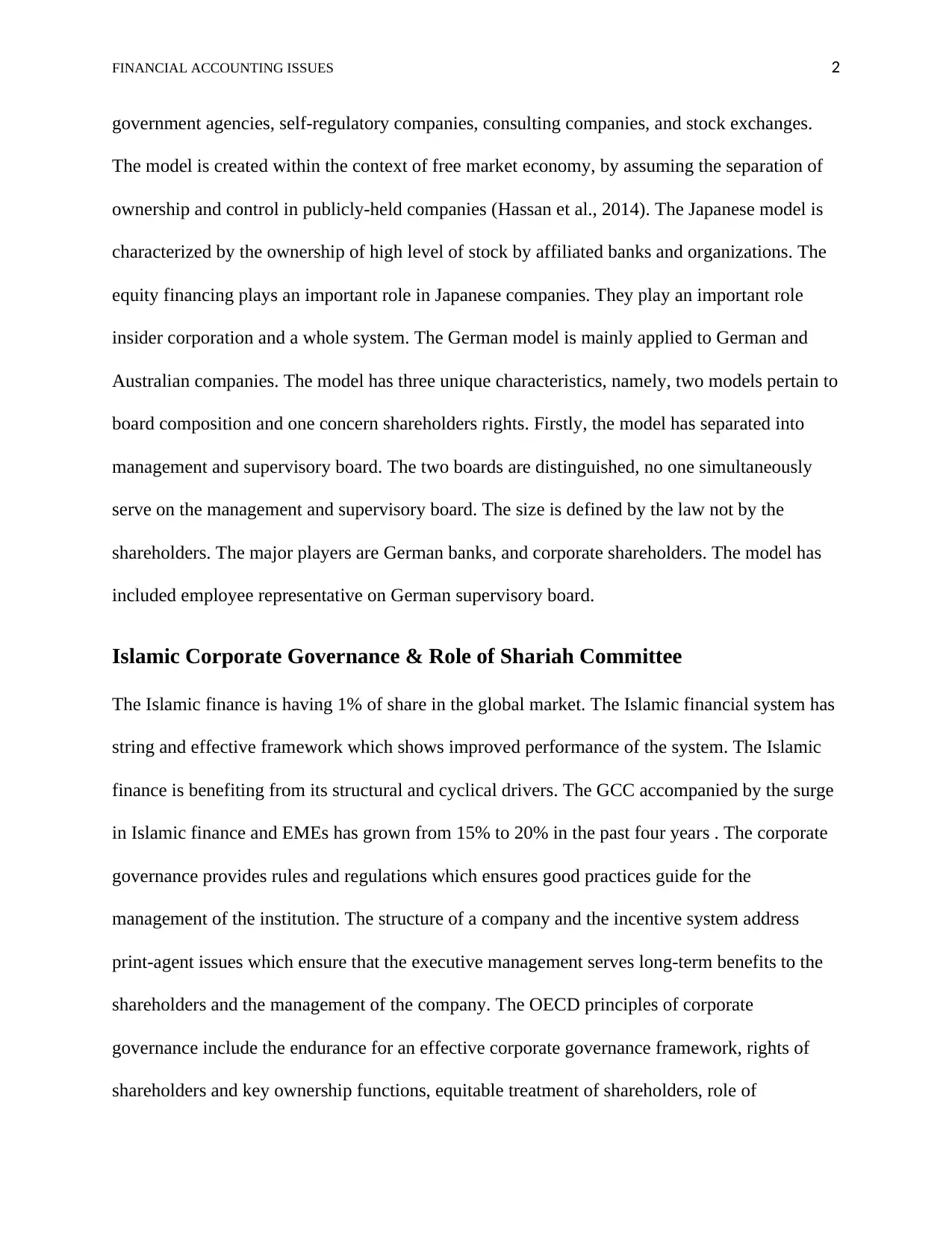
FINANCIAL ACCOUNTING ISSUES 2
government agencies, self-regulatory companies, consulting companies, and stock exchanges.
The model is created within the context of free market economy, by assuming the separation of
ownership and control in publicly-held companies (Hassan et al., 2014). The Japanese model is
characterized by the ownership of high level of stock by affiliated banks and organizations. The
equity financing plays an important role in Japanese companies. They play an important role
insider corporation and a whole system. The German model is mainly applied to German and
Australian companies. The model has three unique characteristics, namely, two models pertain to
board composition and one concern shareholders rights. Firstly, the model has separated into
management and supervisory board. The two boards are distinguished, no one simultaneously
serve on the management and supervisory board. The size is defined by the law not by the
shareholders. The major players are German banks, and corporate shareholders. The model has
included employee representative on German supervisory board.
Islamic Corporate Governance & Role of Shariah Committee
The Islamic finance is having 1% of share in the global market. The Islamic financial system has
string and effective framework which shows improved performance of the system. The Islamic
finance is benefiting from its structural and cyclical drivers. The GCC accompanied by the surge
in Islamic finance and EMEs has grown from 15% to 20% in the past four years . The corporate
governance provides rules and regulations which ensures good practices guide for the
management of the institution. The structure of a company and the incentive system address
print-agent issues which ensure that the executive management serves long-term benefits to the
shareholders and the management of the company. The OECD principles of corporate
governance include the endurance for an effective corporate governance framework, rights of
shareholders and key ownership functions, equitable treatment of shareholders, role of
government agencies, self-regulatory companies, consulting companies, and stock exchanges.
The model is created within the context of free market economy, by assuming the separation of
ownership and control in publicly-held companies (Hassan et al., 2014). The Japanese model is
characterized by the ownership of high level of stock by affiliated banks and organizations. The
equity financing plays an important role in Japanese companies. They play an important role
insider corporation and a whole system. The German model is mainly applied to German and
Australian companies. The model has three unique characteristics, namely, two models pertain to
board composition and one concern shareholders rights. Firstly, the model has separated into
management and supervisory board. The two boards are distinguished, no one simultaneously
serve on the management and supervisory board. The size is defined by the law not by the
shareholders. The major players are German banks, and corporate shareholders. The model has
included employee representative on German supervisory board.
Islamic Corporate Governance & Role of Shariah Committee
The Islamic finance is having 1% of share in the global market. The Islamic financial system has
string and effective framework which shows improved performance of the system. The Islamic
finance is benefiting from its structural and cyclical drivers. The GCC accompanied by the surge
in Islamic finance and EMEs has grown from 15% to 20% in the past four years . The corporate
governance provides rules and regulations which ensures good practices guide for the
management of the institution. The structure of a company and the incentive system address
print-agent issues which ensure that the executive management serves long-term benefits to the
shareholders and the management of the company. The OECD principles of corporate
governance include the endurance for an effective corporate governance framework, rights of
shareholders and key ownership functions, equitable treatment of shareholders, role of
⊘ This is a preview!⊘
Do you want full access?
Subscribe today to unlock all pages.

Trusted by 1+ million students worldwide
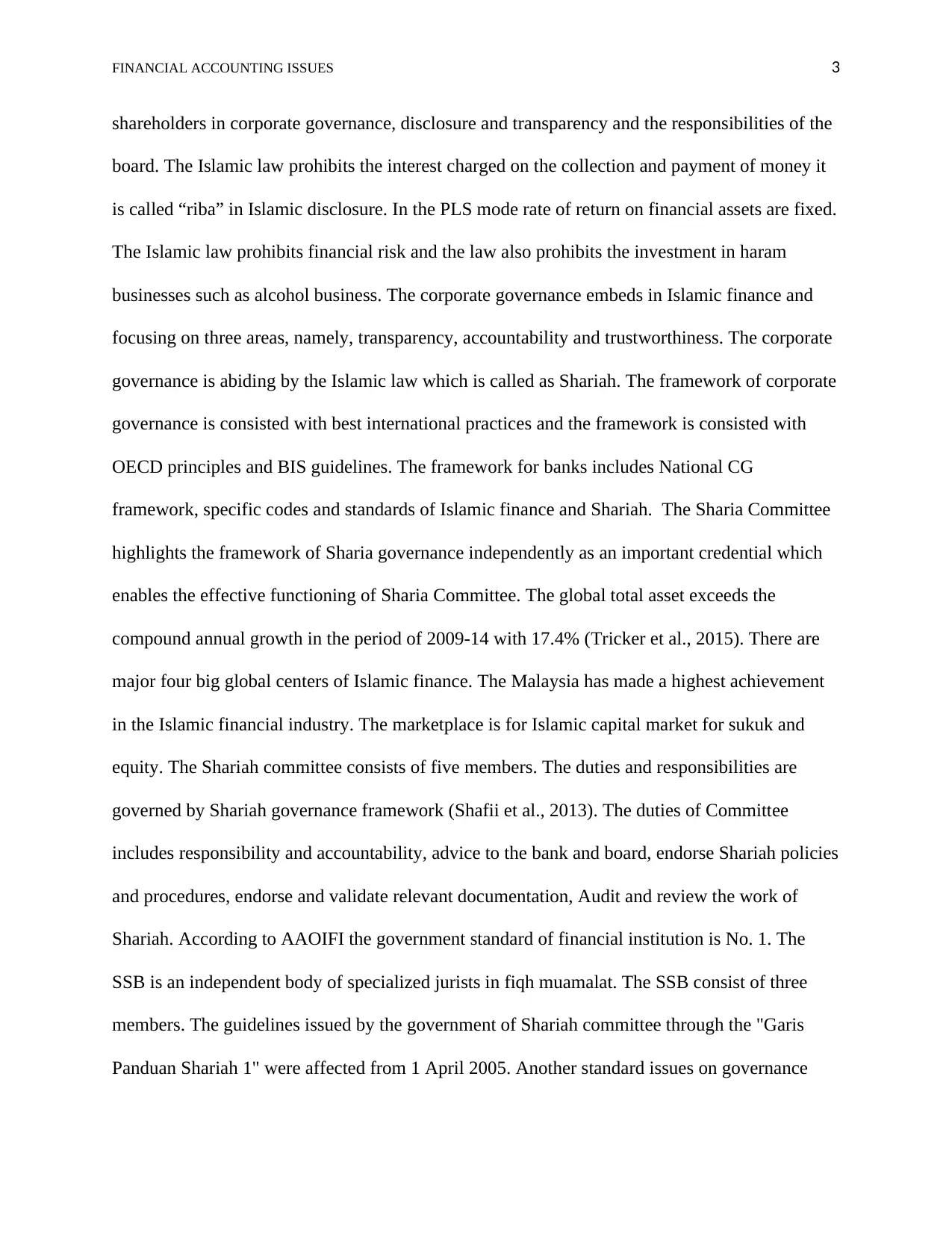
FINANCIAL ACCOUNTING ISSUES 3
shareholders in corporate governance, disclosure and transparency and the responsibilities of the
board. The Islamic law prohibits the interest charged on the collection and payment of money it
is called “riba” in Islamic disclosure. In the PLS mode rate of return on financial assets are fixed.
The Islamic law prohibits financial risk and the law also prohibits the investment in haram
businesses such as alcohol business. The corporate governance embeds in Islamic finance and
focusing on three areas, namely, transparency, accountability and trustworthiness. The corporate
governance is abiding by the Islamic law which is called as Shariah. The framework of corporate
governance is consisted with best international practices and the framework is consisted with
OECD principles and BIS guidelines. The framework for banks includes National CG
framework, specific codes and standards of Islamic finance and Shariah. The Sharia Committee
highlights the framework of Sharia governance independently as an important credential which
enables the effective functioning of Sharia Committee. The global total asset exceeds the
compound annual growth in the period of 2009-14 with 17.4% (Tricker et al., 2015). There are
major four big global centers of Islamic finance. The Malaysia has made a highest achievement
in the Islamic financial industry. The marketplace is for Islamic capital market for sukuk and
equity. The Shariah committee consists of five members. The duties and responsibilities are
governed by Shariah governance framework (Shafii et al., 2013). The duties of Committee
includes responsibility and accountability, advice to the bank and board, endorse Shariah policies
and procedures, endorse and validate relevant documentation, Audit and review the work of
Shariah. According to AAOIFI the government standard of financial institution is No. 1. The
SSB is an independent body of specialized jurists in fiqh muamalat. The SSB consist of three
members. The guidelines issued by the government of Shariah committee through the "Garis
Panduan Shariah 1" were affected from 1 April 2005. Another standard issues on governance
shareholders in corporate governance, disclosure and transparency and the responsibilities of the
board. The Islamic law prohibits the interest charged on the collection and payment of money it
is called “riba” in Islamic disclosure. In the PLS mode rate of return on financial assets are fixed.
The Islamic law prohibits financial risk and the law also prohibits the investment in haram
businesses such as alcohol business. The corporate governance embeds in Islamic finance and
focusing on three areas, namely, transparency, accountability and trustworthiness. The corporate
governance is abiding by the Islamic law which is called as Shariah. The framework of corporate
governance is consisted with best international practices and the framework is consisted with
OECD principles and BIS guidelines. The framework for banks includes National CG
framework, specific codes and standards of Islamic finance and Shariah. The Sharia Committee
highlights the framework of Sharia governance independently as an important credential which
enables the effective functioning of Sharia Committee. The global total asset exceeds the
compound annual growth in the period of 2009-14 with 17.4% (Tricker et al., 2015). There are
major four big global centers of Islamic finance. The Malaysia has made a highest achievement
in the Islamic financial industry. The marketplace is for Islamic capital market for sukuk and
equity. The Shariah committee consists of five members. The duties and responsibilities are
governed by Shariah governance framework (Shafii et al., 2013). The duties of Committee
includes responsibility and accountability, advice to the bank and board, endorse Shariah policies
and procedures, endorse and validate relevant documentation, Audit and review the work of
Shariah. According to AAOIFI the government standard of financial institution is No. 1. The
SSB is an independent body of specialized jurists in fiqh muamalat. The SSB consist of three
members. The guidelines issued by the government of Shariah committee through the "Garis
Panduan Shariah 1" were affected from 1 April 2005. Another standard issues on governance
Paraphrase This Document
Need a fresh take? Get an instant paraphrase of this document with our AI Paraphraser
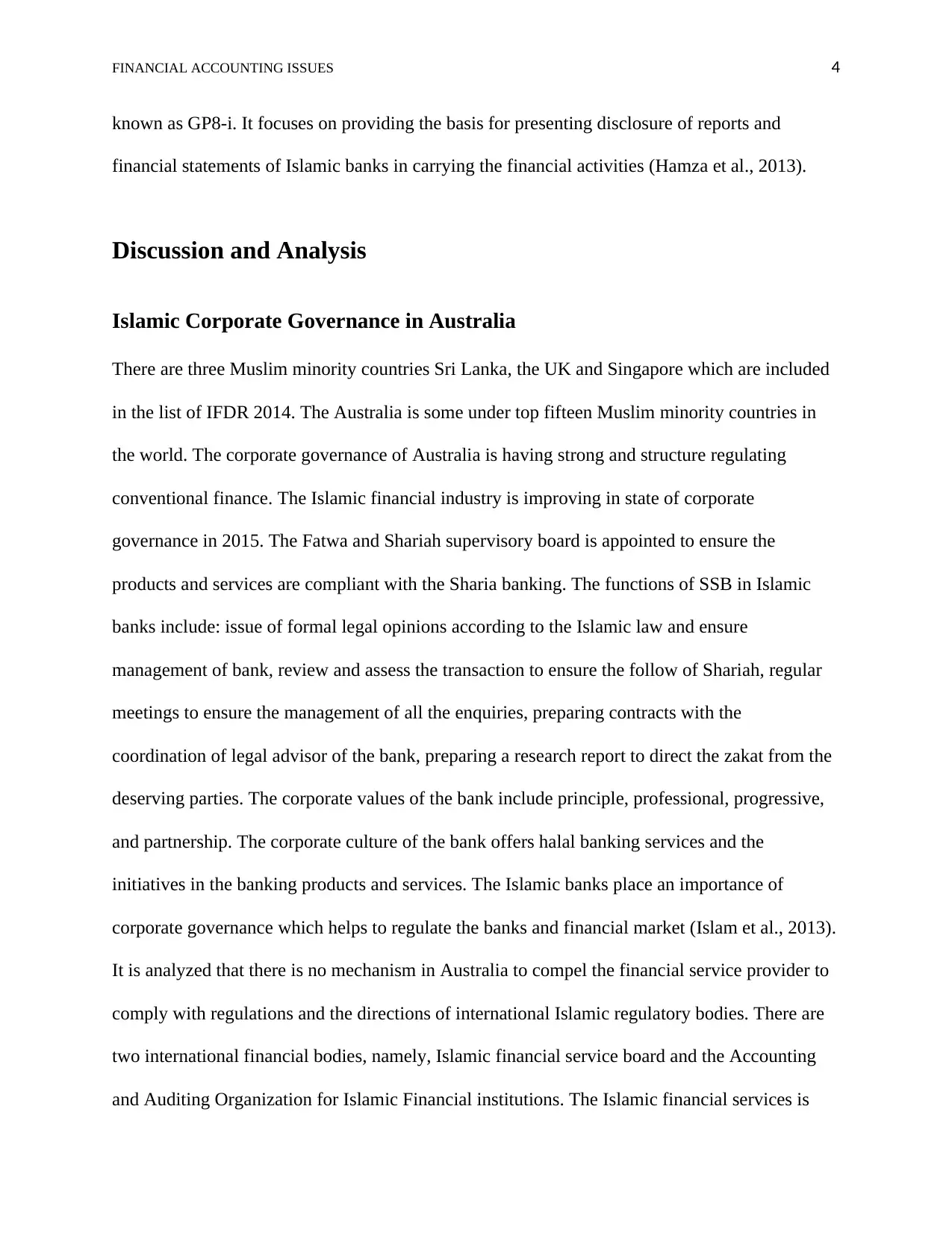
FINANCIAL ACCOUNTING ISSUES 4
known as GP8-i. It focuses on providing the basis for presenting disclosure of reports and
financial statements of Islamic banks in carrying the financial activities (Hamza et al., 2013).
Discussion and Analysis
Islamic Corporate Governance in Australia
There are three Muslim minority countries Sri Lanka, the UK and Singapore which are included
in the list of IFDR 2014. The Australia is some under top fifteen Muslim minority countries in
the world. The corporate governance of Australia is having strong and structure regulating
conventional finance. The Islamic financial industry is improving in state of corporate
governance in 2015. The Fatwa and Shariah supervisory board is appointed to ensure the
products and services are compliant with the Sharia banking. The functions of SSB in Islamic
banks include: issue of formal legal opinions according to the Islamic law and ensure
management of bank, review and assess the transaction to ensure the follow of Shariah, regular
meetings to ensure the management of all the enquiries, preparing contracts with the
coordination of legal advisor of the bank, preparing a research report to direct the zakat from the
deserving parties. The corporate values of the bank include principle, professional, progressive,
and partnership. The corporate culture of the bank offers halal banking services and the
initiatives in the banking products and services. The Islamic banks place an importance of
corporate governance which helps to regulate the banks and financial market (Islam et al., 2013).
It is analyzed that there is no mechanism in Australia to compel the financial service provider to
comply with regulations and the directions of international Islamic regulatory bodies. There are
two international financial bodies, namely, Islamic financial service board and the Accounting
and Auditing Organization for Islamic Financial institutions. The Islamic financial services is
known as GP8-i. It focuses on providing the basis for presenting disclosure of reports and
financial statements of Islamic banks in carrying the financial activities (Hamza et al., 2013).
Discussion and Analysis
Islamic Corporate Governance in Australia
There are three Muslim minority countries Sri Lanka, the UK and Singapore which are included
in the list of IFDR 2014. The Australia is some under top fifteen Muslim minority countries in
the world. The corporate governance of Australia is having strong and structure regulating
conventional finance. The Islamic financial industry is improving in state of corporate
governance in 2015. The Fatwa and Shariah supervisory board is appointed to ensure the
products and services are compliant with the Sharia banking. The functions of SSB in Islamic
banks include: issue of formal legal opinions according to the Islamic law and ensure
management of bank, review and assess the transaction to ensure the follow of Shariah, regular
meetings to ensure the management of all the enquiries, preparing contracts with the
coordination of legal advisor of the bank, preparing a research report to direct the zakat from the
deserving parties. The corporate values of the bank include principle, professional, progressive,
and partnership. The corporate culture of the bank offers halal banking services and the
initiatives in the banking products and services. The Islamic banks place an importance of
corporate governance which helps to regulate the banks and financial market (Islam et al., 2013).
It is analyzed that there is no mechanism in Australia to compel the financial service provider to
comply with regulations and the directions of international Islamic regulatory bodies. There are
two international financial bodies, namely, Islamic financial service board and the Accounting
and Auditing Organization for Islamic Financial institutions. The Islamic financial services is
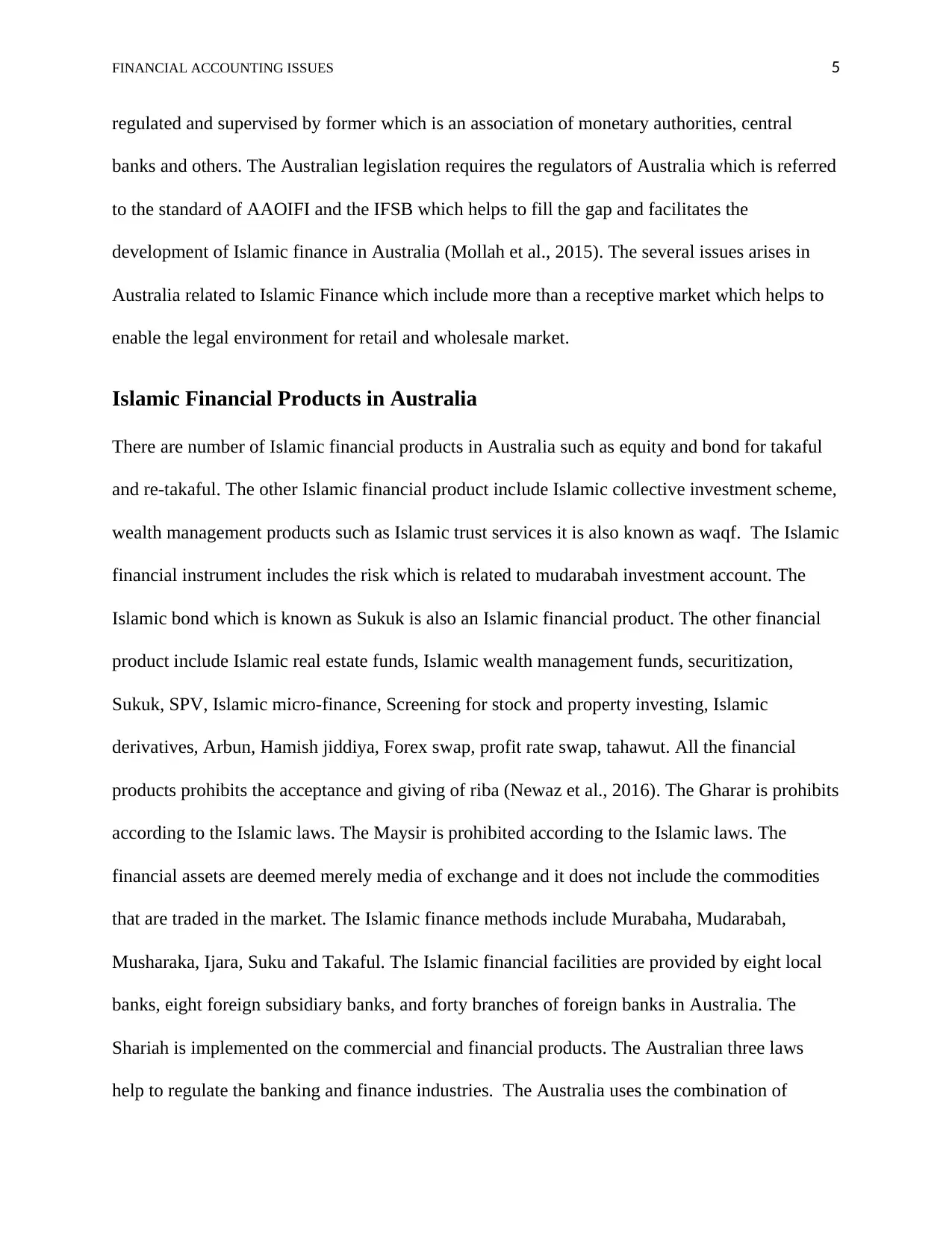
FINANCIAL ACCOUNTING ISSUES 5
regulated and supervised by former which is an association of monetary authorities, central
banks and others. The Australian legislation requires the regulators of Australia which is referred
to the standard of AAOIFI and the IFSB which helps to fill the gap and facilitates the
development of Islamic finance in Australia (Mollah et al., 2015). The several issues arises in
Australia related to Islamic Finance which include more than a receptive market which helps to
enable the legal environment for retail and wholesale market.
Islamic Financial Products in Australia
There are number of Islamic financial products in Australia such as equity and bond for takaful
and re-takaful. The other Islamic financial product include Islamic collective investment scheme,
wealth management products such as Islamic trust services it is also known as waqf. The Islamic
financial instrument includes the risk which is related to mudarabah investment account. The
Islamic bond which is known as Sukuk is also an Islamic financial product. The other financial
product include Islamic real estate funds, Islamic wealth management funds, securitization,
Sukuk, SPV, Islamic micro-finance, Screening for stock and property investing, Islamic
derivatives, Arbun, Hamish jiddiya, Forex swap, profit rate swap, tahawut. All the financial
products prohibits the acceptance and giving of riba (Newaz et al., 2016). The Gharar is prohibits
according to the Islamic laws. The Maysir is prohibited according to the Islamic laws. The
financial assets are deemed merely media of exchange and it does not include the commodities
that are traded in the market. The Islamic finance methods include Murabaha, Mudarabah,
Musharaka, Ijara, Suku and Takaful. The Islamic financial facilities are provided by eight local
banks, eight foreign subsidiary banks, and forty branches of foreign banks in Australia. The
Shariah is implemented on the commercial and financial products. The Australian three laws
help to regulate the banking and finance industries. The Australia uses the combination of
regulated and supervised by former which is an association of monetary authorities, central
banks and others. The Australian legislation requires the regulators of Australia which is referred
to the standard of AAOIFI and the IFSB which helps to fill the gap and facilitates the
development of Islamic finance in Australia (Mollah et al., 2015). The several issues arises in
Australia related to Islamic Finance which include more than a receptive market which helps to
enable the legal environment for retail and wholesale market.
Islamic Financial Products in Australia
There are number of Islamic financial products in Australia such as equity and bond for takaful
and re-takaful. The other Islamic financial product include Islamic collective investment scheme,
wealth management products such as Islamic trust services it is also known as waqf. The Islamic
financial instrument includes the risk which is related to mudarabah investment account. The
Islamic bond which is known as Sukuk is also an Islamic financial product. The other financial
product include Islamic real estate funds, Islamic wealth management funds, securitization,
Sukuk, SPV, Islamic micro-finance, Screening for stock and property investing, Islamic
derivatives, Arbun, Hamish jiddiya, Forex swap, profit rate swap, tahawut. All the financial
products prohibits the acceptance and giving of riba (Newaz et al., 2016). The Gharar is prohibits
according to the Islamic laws. The Maysir is prohibited according to the Islamic laws. The
financial assets are deemed merely media of exchange and it does not include the commodities
that are traded in the market. The Islamic finance methods include Murabaha, Mudarabah,
Musharaka, Ijara, Suku and Takaful. The Islamic financial facilities are provided by eight local
banks, eight foreign subsidiary banks, and forty branches of foreign banks in Australia. The
Shariah is implemented on the commercial and financial products. The Australian three laws
help to regulate the banking and finance industries. The Australia uses the combination of
⊘ This is a preview!⊘
Do you want full access?
Subscribe today to unlock all pages.

Trusted by 1+ million students worldwide
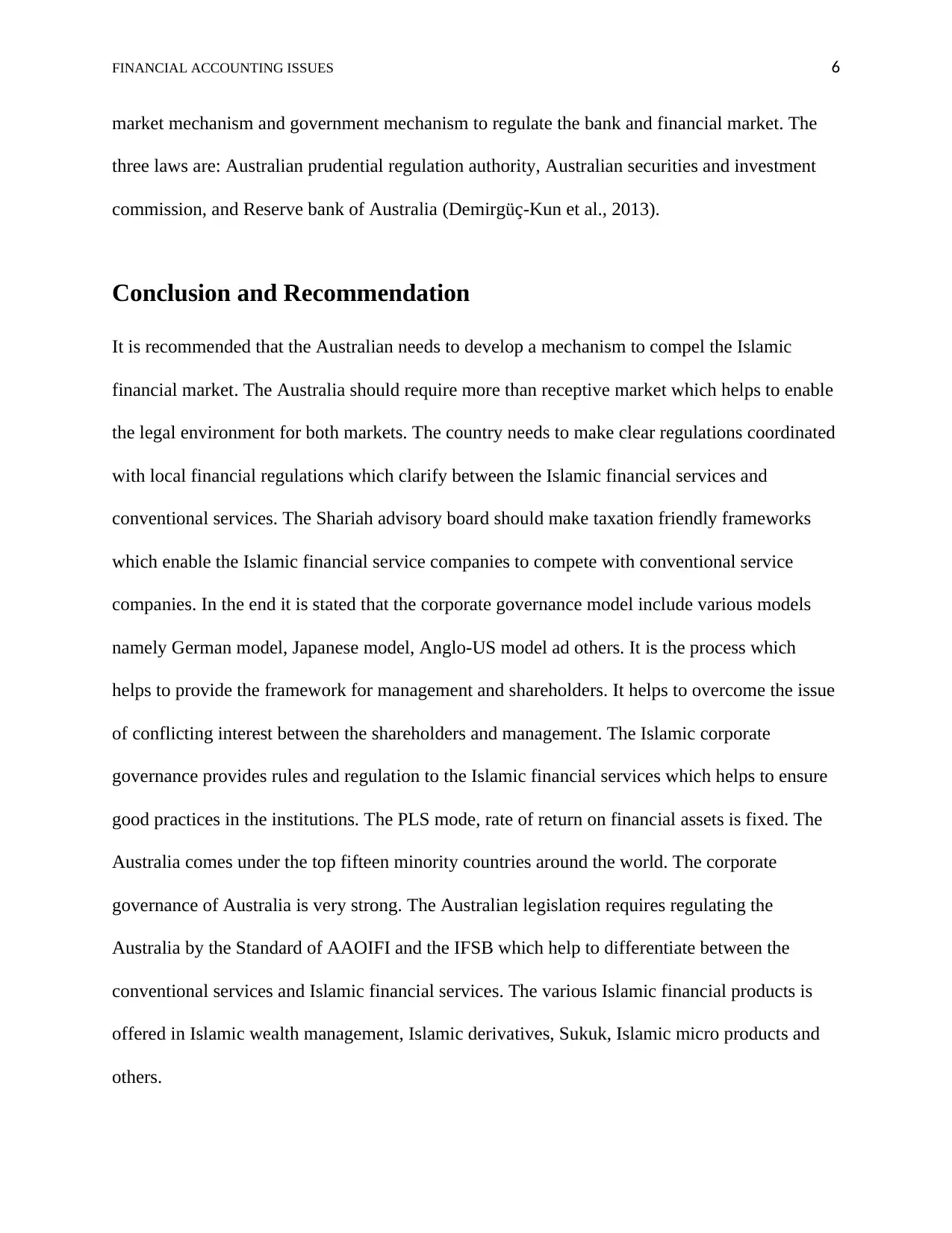
FINANCIAL ACCOUNTING ISSUES 6
market mechanism and government mechanism to regulate the bank and financial market. The
three laws are: Australian prudential regulation authority, Australian securities and investment
commission, and Reserve bank of Australia (Demirgüç-Kun et al., 2013).
Conclusion and Recommendation
It is recommended that the Australian needs to develop a mechanism to compel the Islamic
financial market. The Australia should require more than receptive market which helps to enable
the legal environment for both markets. The country needs to make clear regulations coordinated
with local financial regulations which clarify between the Islamic financial services and
conventional services. The Shariah advisory board should make taxation friendly frameworks
which enable the Islamic financial service companies to compete with conventional service
companies. In the end it is stated that the corporate governance model include various models
namely German model, Japanese model, Anglo-US model ad others. It is the process which
helps to provide the framework for management and shareholders. It helps to overcome the issue
of conflicting interest between the shareholders and management. The Islamic corporate
governance provides rules and regulation to the Islamic financial services which helps to ensure
good practices in the institutions. The PLS mode, rate of return on financial assets is fixed. The
Australia comes under the top fifteen minority countries around the world. The corporate
governance of Australia is very strong. The Australian legislation requires regulating the
Australia by the Standard of AAOIFI and the IFSB which help to differentiate between the
conventional services and Islamic financial services. The various Islamic financial products is
offered in Islamic wealth management, Islamic derivatives, Sukuk, Islamic micro products and
others.
market mechanism and government mechanism to regulate the bank and financial market. The
three laws are: Australian prudential regulation authority, Australian securities and investment
commission, and Reserve bank of Australia (Demirgüç-Kun et al., 2013).
Conclusion and Recommendation
It is recommended that the Australian needs to develop a mechanism to compel the Islamic
financial market. The Australia should require more than receptive market which helps to enable
the legal environment for both markets. The country needs to make clear regulations coordinated
with local financial regulations which clarify between the Islamic financial services and
conventional services. The Shariah advisory board should make taxation friendly frameworks
which enable the Islamic financial service companies to compete with conventional service
companies. In the end it is stated that the corporate governance model include various models
namely German model, Japanese model, Anglo-US model ad others. It is the process which
helps to provide the framework for management and shareholders. It helps to overcome the issue
of conflicting interest between the shareholders and management. The Islamic corporate
governance provides rules and regulation to the Islamic financial services which helps to ensure
good practices in the institutions. The PLS mode, rate of return on financial assets is fixed. The
Australia comes under the top fifteen minority countries around the world. The corporate
governance of Australia is very strong. The Australian legislation requires regulating the
Australia by the Standard of AAOIFI and the IFSB which help to differentiate between the
conventional services and Islamic financial services. The various Islamic financial products is
offered in Islamic wealth management, Islamic derivatives, Sukuk, Islamic micro products and
others.
Paraphrase This Document
Need a fresh take? Get an instant paraphrase of this document with our AI Paraphraser
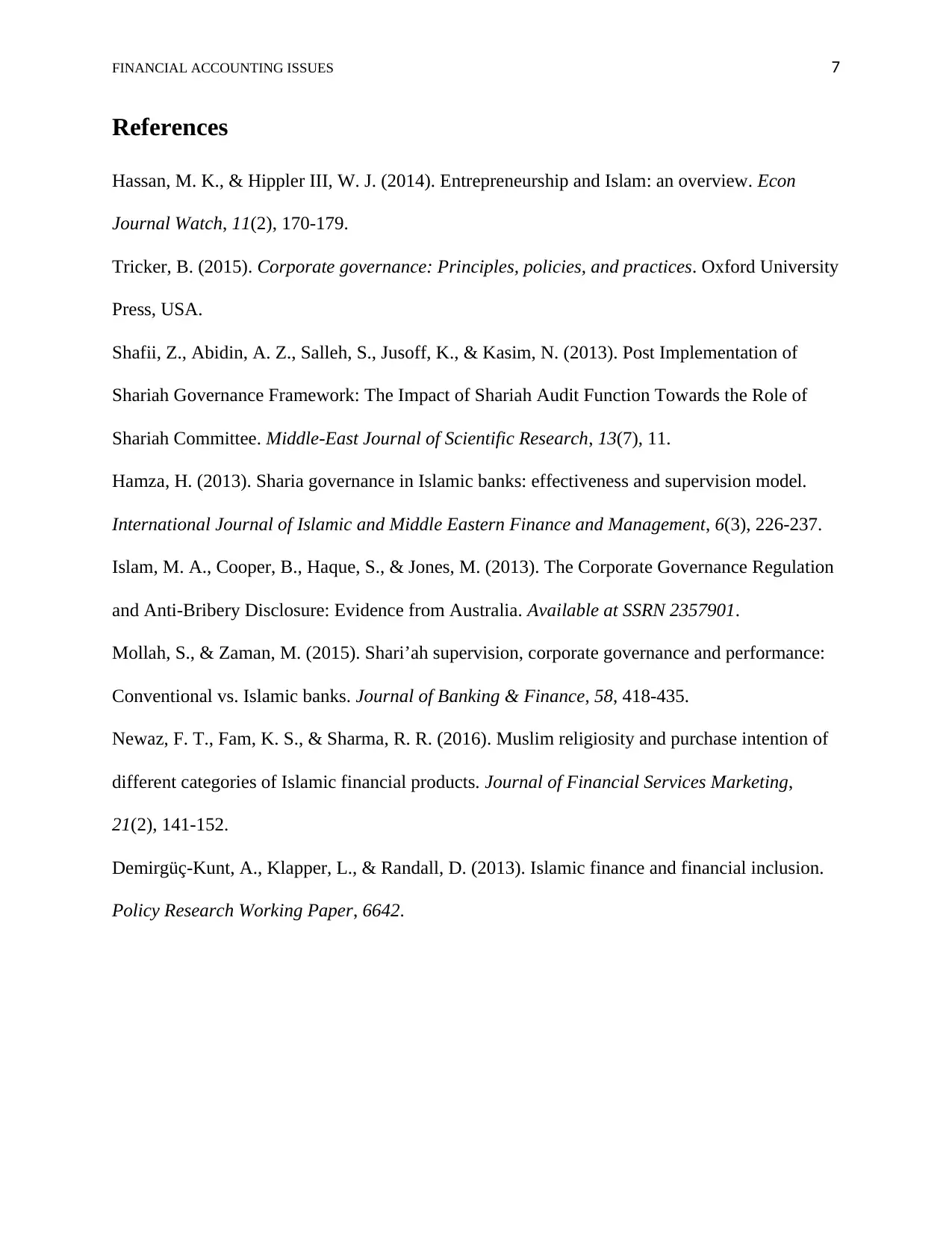
FINANCIAL ACCOUNTING ISSUES 7
References
Hassan, M. K., & Hippler III, W. J. (2014). Entrepreneurship and Islam: an overview. Econ
Journal Watch, 11(2), 170-179.
Tricker, B. (2015). Corporate governance: Principles, policies, and practices. Oxford University
Press, USA.
Shafii, Z., Abidin, A. Z., Salleh, S., Jusoff, K., & Kasim, N. (2013). Post Implementation of
Shariah Governance Framework: The Impact of Shariah Audit Function Towards the Role of
Shariah Committee. Middle-East Journal of Scientific Research, 13(7), 11.
Hamza, H. (2013). Sharia governance in Islamic banks: effectiveness and supervision model.
International Journal of Islamic and Middle Eastern Finance and Management, 6(3), 226-237.
Islam, M. A., Cooper, B., Haque, S., & Jones, M. (2013). The Corporate Governance Regulation
and Anti-Bribery Disclosure: Evidence from Australia. Available at SSRN 2357901.
Mollah, S., & Zaman, M. (2015). Shari’ah supervision, corporate governance and performance:
Conventional vs. Islamic banks. Journal of Banking & Finance, 58, 418-435.
Newaz, F. T., Fam, K. S., & Sharma, R. R. (2016). Muslim religiosity and purchase intention of
different categories of Islamic financial products. Journal of Financial Services Marketing,
21(2), 141-152.
Demirgüç-Kunt, A., Klapper, L., & Randall, D. (2013). Islamic finance and financial inclusion.
Policy Research Working Paper, 6642.
References
Hassan, M. K., & Hippler III, W. J. (2014). Entrepreneurship and Islam: an overview. Econ
Journal Watch, 11(2), 170-179.
Tricker, B. (2015). Corporate governance: Principles, policies, and practices. Oxford University
Press, USA.
Shafii, Z., Abidin, A. Z., Salleh, S., Jusoff, K., & Kasim, N. (2013). Post Implementation of
Shariah Governance Framework: The Impact of Shariah Audit Function Towards the Role of
Shariah Committee. Middle-East Journal of Scientific Research, 13(7), 11.
Hamza, H. (2013). Sharia governance in Islamic banks: effectiveness and supervision model.
International Journal of Islamic and Middle Eastern Finance and Management, 6(3), 226-237.
Islam, M. A., Cooper, B., Haque, S., & Jones, M. (2013). The Corporate Governance Regulation
and Anti-Bribery Disclosure: Evidence from Australia. Available at SSRN 2357901.
Mollah, S., & Zaman, M. (2015). Shari’ah supervision, corporate governance and performance:
Conventional vs. Islamic banks. Journal of Banking & Finance, 58, 418-435.
Newaz, F. T., Fam, K. S., & Sharma, R. R. (2016). Muslim religiosity and purchase intention of
different categories of Islamic financial products. Journal of Financial Services Marketing,
21(2), 141-152.
Demirgüç-Kunt, A., Klapper, L., & Randall, D. (2013). Islamic finance and financial inclusion.
Policy Research Working Paper, 6642.
1 out of 8
Related Documents
Your All-in-One AI-Powered Toolkit for Academic Success.
+13062052269
info@desklib.com
Available 24*7 on WhatsApp / Email
![[object Object]](/_next/static/media/star-bottom.7253800d.svg)
Unlock your academic potential
Copyright © 2020–2026 A2Z Services. All Rights Reserved. Developed and managed by ZUCOL.





